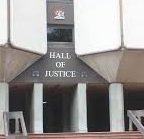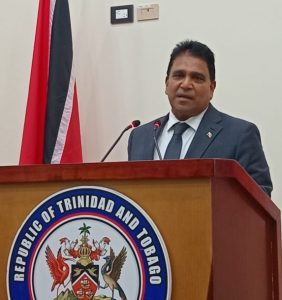By Peter Richards
PORT OF SPAIN -The Trinidad-based Caribbean Court of Justice (CCJ) on Tuesday dismissed a lawsuit brought against the Trinidad and Tobago government over the 2009 collapse of the British American Insurance Co Ltd and Colonial Life Insurance Co Ltd (CLICO) insurance giants.
“The claim is dismissed and the parties were ordered to bear their own costs,” CCJ President, Justice Adrian Saunders said in the summary of the judgement.
The British American Insurance Co Ltd and Colonial Life Insurance Co Ltd Policy Holders Group (BACOL) brought the lawsuit, claiming that after 15 years of perseverance, it has “significantly advanced the pursuit of financial justice” for policyholders in Antigua and Barbuda, Dominica, Grenada, Montserrat, St Kitts and Nevis, St Lucia and St Vincent and the Grenadines who have “suffered extreme financial loss and hardship” after the collapse of the British American Insurance Co Ltd (BAICO).
BACOL said the collapse resulted in losses of over EC$800,000,000 (One EC dollar=US$0.37 cents) to businesses and individuals.
In April, the matter of Ellis Richards and others versus Trinidad and Tobago was heard by the CCJ, with the lawyers for the policyholders arguing that the T&T government breached the Revised Treaty of Chaguaramas (RTC), which established the Caribbean Single Market and Economy (CSME), by bailing out certain local CL Financial (CLF) subsidiaries such as CLICO and British American Trinidad (BAT) and not regional subsidiaries such as BAICO.
The lawyers, including former St Lucia prime minister, Dr Kenny Anthony, said that while local policyholders were protected and essentially guaranteed their full investments, the Eastern Caribbean policyholders were only able to recoup approximately 14% of their investments through the liquidation of the regional subsidiary.
King’s Counsel Simon Davenport said that the T&T government’s actions breached Article 7 of the RTC, which prohibits discrimination based on nationality.

But in response, Senior Counsel Deborah Peake, had argued there was no evidence that BAICO’s assets were used in the bailout.
She said when the T&T government signed a memorandum of understanding (MoU) with CL Financial for the bailout in 2009, only three local subsidiaries CLICO, BAT and Clico Investment Bank (CIB) were under consideration and not CLF’s 39 other local, regional and international subsidiaries such as BAICO.
The CCJ, which has an Original Jurisdiction, also acts as an international tribunal interpreting the RTC that governs the regional integration movement, CARICOM.
Justice Saunders in the summary ruling noted after the collapse of CLF in early 2009, T&T decided to rescue or bail out CLF, and it’s T&T registered subsidiaries, engaging in a series of measures including assumption of control of CLICO and BAT, the provision of liquidity support, injection of funds and the purchase of the rights of some policyholders of CLICO and BAT to mitigate the effects of the collapse on policy holders and the wider Trinidad and Tobago economy.

Justice Saunders said that in the process, policyholders of BAT were afforded relief for money lost as a result of the collapse, but policyholders of BAICO were not.
“The claim arose out of these actions taken by the defendant. Claimants originally brought a claim alleging that the defendant breached articles… of the of the revised Treaty of Chaguaramas”.
He said in relation to the state of T&T, the Court concluded that on the facts the defendants intervention in and bailout of CLF and its Trinidadian subsidiaries were properly within the exception provided in Article 32 of the RTC, that is, “activities in a member state involved in the exercise of governmental authority.”
He said there were two broad claims of the claimants that remained to be adjudicated, and they were examined in the present proceedings under the headings, whether the defendant’s actions in bailing out CLICO and BAT constituted a breach of Article 184 1J and whether the defendant’s actions in building out CLICO and BAT constituted a breach of Article 7 of the RTC.
Justice Saunders said the Court noted that Article 184 fell on chapter eight of the treaty, which is broadly titled, competition policy and consumer protection and rather than considering Article 184 in isolation, the Court referred to the surrounding provisions on the chapter eight, such as article 169 which sets out the objectives of the Community competition policy, and Article 170 which delineated what is expected of the Community and member states to achieve the objectives set out in Article 169.
“Interpreting the foregoing articles and applying the ordinary meeting, the Court found that chapter eight of the RTC is concerned with encouraging a strong and vibrant community market by the enactment by member states, of legislation and regulations prohibiting anti-competitive conduct, promoting fair competition, promoting the interests of consumers, protecting consumers and achieving harmonisation of competition policies throughout the community.”
Justice Saunders said in the absence of such legislation and regulations, a presumed failure to abide by Article 184 did not create liability for individual member states of the Community.
“Further the allegations of breaches of Article 7 and Article 184(1)(j)both depended on whether the claimants were consumers. The Court considered three preliminary issues to determine whether the claimants all qualified as consumers to pursue the alleged breaches of the provisions of the treaty, not all of which were fully argued by the parties.
“These issues concerned, one, whether the definition of consumers is restricted to natural persons or whether it includes legal persons. Two, whether the claimants qualify as recipients of goods and services within the meeting of the RTC and three, whether the claimants have satisfied the two limbs of Article 184(2) to be considered consumers.”
Justice Saunders said as the matters were not fully argued by the parties the Court discussed but did not make a determination on the resolution of these issues.

“The Court found that Article 184 (1)(j) which required member states to provide “adequate and effective redress for consumers” could not be read in isolation from its broader juridical or legal context”.
Justice Saunders said in determining the juridical character of Article 184 (1)(j) an important first step was to appreciate that the provisions must be placed in the broader context of competition policy and Consumer Protection Law. It was also significant to consider the institutional arrangements that have been established as well as in nature of the language used to impose obligations.
He said the Court noted that the language used in chapter eight of the RTC, in general and specifically in Article 184 is not always conducive to allocating state liability for breach Article 184 is concerned with the promotion of consumer interests.

He said that the member states were then obliged to “promote the interests of consumers in the community by appropriate measures” and it is not permissible to pluck a single provision from the list, for example, Article 184 (1)(j) and to give it a special legal status which the other provisions in Article quality for one cannot bear.
“It is therefore not the intention of the framers of the RTC to ascribe state liability in respect of a particular action by a state outside an agreed regional framework,” Justice Saunders said, noting that the claimants argued that a member state cannot cite the peculiarities of its own legal order to avoid its obligations on the international law, particularly the RTC.
“Further, the claimants argued that the defendant exercised emergency powers to prevent BAICO policy holders from enforcing rights to CLF assets on an equal footing with BAT policyholders.
“The defendant rebutted that it would have been improper for its Parliament to amend the Central Bank Act, Chapter 79(02), and to permit the exercise of emergency powers by the Central Bank of Trinidad and Tobago in respect of BAICO, the financial institution incorporated outside of the defendant.”

Justice Saunders said that the Court noted that this argument against extraterritorial regulation, accorded with submission of Council for the Caribbean Community, that legislation adopted by a member state did not apply extraterritorial, and as noted by CARICOM, the RTC does not contain language which obliges these member states to provide mechanisms to facilitate the extra-territorial reach of its legislative, political, judicial decisions to other member states.
“The Court agreed that the defendant could not have assumed control of BAICO by way of amendments to its Central Bank Act to guarantee that BAICO policyholders and or depositors were afforded remedies in the aftermath of CLF collapse. “
Justice Saunders said to do so would have been to have acted in an extra territorial manner that would have been, in the absence of regional agreement, contrary to the conformity among CARICOM member member states.

He said the Court then considered whether there was a breach of Article Seven of the treaty, noting that the Court stated that Article seven is not a free standing provision whose breach may give rise to a claim at large.
“Any allegation of a breach of Article seven must be accompanied by and must point to a treaty right in respect of which the claimant must prove discrimination in the enjoyment of that right, and further any such discrimination must be based on nationality only.”
He said the Court referenced its remarks made to this effect in Douglas and the Commonwealth of Dominica, with the claimant submitting that the Court is not bound by its dicta in Douglas and that the dicta ought to be revisited after proper analysis and reference to authorities on the point.
He said the Court accepted that separate and apart from its power of revision contained in Article 2.9, it may revisit a previous decision where there are very clear grounds for doing so.
‘However, this is not to be done lightly and without full argumentation from the parties involved and the claimants have not provided any good reason for the court to do so on this occasion.
“Additionally to establish discrimination on the Article seven claimants must have established, one, that they were treated worse or less favourably persons whose circumstances were similar to theirs ( comparators), except for their and the comparators’ nationality, and two, that there was no objective and reasonable justification for the difference in treatment, and three, that the worst or less favorable treatment occurred in the context of activity that was within the scope of the revised treaty. “
The CCJ President said that the Court found that the circumstances of policyholders of CLICO, BAT and CIB were not similar to other policyholders and “this was due to the findings of the Court that the defendant’s actions formed part of a governmental bailout of private commercial entities with a view to preventing severe dislocation to its economy.
“The Court noted that if the claim was arguments were correct, it would mean that the defendant would have been responsible for bailing out all BAICO policyholders in other Caribbean territories.
‘The Court found that it could not have been within the contemplation of the framers of the RTC that the member states in such circumstances would be obliged to compensate all BAICO policyholders in all CARICOM states for all their loss and damage.”

Justice Saunders said the Court accepted that this is an objective and reasonable justification for the alleged difference in treatment of the companies.
“The Court considered there was no obligation to extend any relief to institutions outside of the defendant member state, and therefore no right in the claimants to obtain the relief they sought,” he said, adding “the claim is dismissed and the parties were ordered to bear their own costs.” (CMC)
![]()











